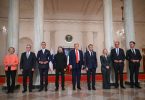The BRICS cooperation mechanism is a key platform for solidarity and collaboration between emerging markets and developing countries. In the face of rising hegemonism, unilateralism and protectionism, BRICS, as “the first echelon of the Global South”, persists in promoting openness, inclusiveness, cooperation and win-win results to build a community with a shared future for humanity.
So when the leaders of BRICS convened virtually on Monday, the gathering carried a resonance beyond the screens that connected the BRICS member states only. It was a reaffirmation of a vision for a more just and equitable global governance system.
President Xi Jinping gave a speech and had in-depth exchanges with the other participating leaders on the current economic environment, the multilateral system, BRICS cooperation and important issues of mutual concern.
Xi’s remarks remind the world that BRICS is an emerging force representing the Global South that advocates fairness and justice in global governance. It is a grouping that seeks not dominance but cooperation, not confrontation but coordination, and aims not to challenge but to reform.
He highlighted the need for BRICS to uphold multilateralism and safeguard international fairness and justice; uphold openness and win-win endeavors and maintain the international economic and trade order; and uphold unity and cooperation and build synergy for common development.
To that end, China will continue to play a pivotal role. From proposing the “BRICS Plus” model, which has widened the circle of cooperation to more countries in the Global South, to championing the establishment of the New Development Bank, Beijing has consistently infused BRICS with ideas and institutions.
Xi’s proposals at the meeting are not abstract. In terms of BRICS cooperation, they will find concrete expression in real infrastructure, the powering of green energy transitions, and the strengthening of public health systems.
In a world still struggling to address the climate emergency and supply-chain shocks caused by trade wars, the value of BRICS’ practical, solidarity-based cooperation cannot be overstated.
Xi’s call for defending multilateralism comes at a critical time when that principle is under strain. International organizations designed to give voice to all nations have too often been hamstrung by unilateralists. Against this backdrop, BRICS represents an alternative ethos: one rooted in consultation, joint contributions and shared benefits.
The substance of BRICS cooperation addresses the different needs of its members. Exemplifying how BRICS can harness cutting-edge innovation for inclusive growth, China has driven forward initiatives in technology, digital transformation and industrial modernization under the BRICS framework. The launch of the China-BRICS Artificial Intelligence Development and Cooperation Center and the BRICS Digital Ecosystem Cooperation Network signal that technological progress need not be monopolized by a handful of nations; instead, it can serve as a shared tool for narrowing development gaps.
From Brazil’s wind farms to South Africa’s solar projects, BRICS collaboration — often with Chinese investment and expertise — has delivered tangible contributions to renewable energy and climate resilience. The New Development Bank’s growing portfolio of green bonds further positions the bloc as a driver of low-carbon growth at a time when the planet desperately needs it.
What emerged from the meeting is not a bloc set against another, but a community working toward what China has advocated — a shared future for humanity. It is an aspiration anchored in the belief that peace and prosperity are indivisible, that the problems of one region inevitably ripple outward, and that inclusive solutions are not only more just but also more effective.
Skeptics will note that BRICS encompasses countries with diverse national conditions. Yet it is precisely this diversity that gives the mechanism its credibility. Its achievements — whether in financial cooperation, climate action or cultural exchanges — demonstrate that unity is possible without uniformity. The expansion of BRICS in recent years further underscores its openness: It welcomes those willing to collaborate, not on the basis of ideology but on the shared pursuit of development and dignity.
China stands ready to work with other parties to further act on the BRICS spirit of openness, inclusiveness and win-win cooperation, and to jointly work for a more equitable and orderly multipolar world.







